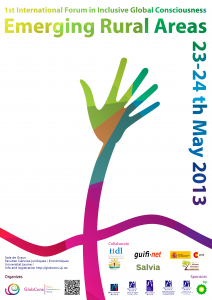Opening
Food Security panel
Natural Environment panel
Participation and Empowerment Technologies
Final synthesis
Programme
Participants
Location
The global crisis is transforming the traditional North-South vertical relationship. This reality is creating a new sensitivity to recognize similarities respecting the idiosyncrasies of each society. In this sense, we have a new economic and social settings in a global context, which is a rapprochement between countries at different stages of development. This shift means that in recent years has appear the term «4th world» as a name for the existing areas of poverty in the so-called «1st world». In rural areas, the situation is aggravated due to the intensification of resource scarcity. However, and paradoxically the features of these territories become privileged areas for a new point of view for sustainable development.
This point of view introduces the rural areas in the frame of a network society to avoid the digital divide. Indeed, this change coming from technology could become an opportunity for the rural areas development. We must be aware of the changes we are doing to the planet. Indeed, is important to focus on climate change and its consequences at all levels. Therefore, it is important to emphasize the role of forest areas in the climate change. The society get profit from forest environments such as, CO2 sequestration, erosion protection, water cycle regulation, biodiversity conservation, etc. Also agriculture contributes fixing the population in rural areas and its communities, finally but not least to food security in wide areas of the planet.
In this climate change context we have to add water resource as a restriction to food production. A better management in water resources could become crucial for food production. Topics such as sustainable irrigation with a minimum energy and water consumption, planning in water extraction reservoirs or suitable pumping water systems are important topics to face up in wide areas of the planet. Network knowledge must contribute in the enhancement of information and training to reduce risk factors and reduce its consequences. Rural society must perceive the existing risk being conscious of its situation and moving to empower themselves in order to confront the risk.
These efforts must come with changes in organizations involved in sustainable livelihood . From this point of view, private sector NGO and official organization area a basic structure in a global world with and increasing importance regarding to the crisis of other basic systems. Moreover, work is a fundamental activity for human beings, contributing to their subsistence, giving sense to their existence and self-realization. Nevertheless, work could become an exploitation and degradation for human beings and its communities. A trend to one of both contexts depends on organization capacity of being healthy and contribute to reach a good quality of life among population. Healthy development among organizations (similar to healthy cities movement WHO, 1986), requires a human being development, its communities and also the organizations within a harmonization . Evolution from decent work to autentizotic or eupsquic organization requires the introduction of community health in which organizations are working. This will be empowering individuals and communities to develop their potential, through the construction of organizations sensitive to changes in rural areas.
Also in this context it becomes essential to know how involved stakeholders perceive (organizations, states and citizens of rural and urban areas) the changing current situation and what kind of skills and abilities take to address them. In this context, you can not ignore the role of beliefs, values ??and attitudes of the people, and their own skills, in prescribing behavior. These mind maps are, in part, responsible for the construction of social reality and therefore, to perceive the current situation as an opportunity or a threat on which to act. In its analysis, also need to consider the socialization framework from which have been developed and therefore the influence of some relevant variables such as gender.

